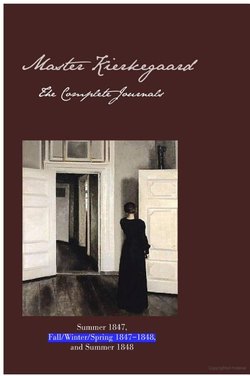Читать книгу Master Kierkegaard: The Complete Journals - Ellen Brown - Страница 7
На сайте Литреса книга снята с продажи.
Journal Two
Оглавление(July 15–August 19, 1847)
July 15
Another brilliant day—taking in the light, soaking it up like a pale plant after a long rainy season. Too much water, not enough fire. My master tells me the book he is writing will be called Works of Love, a play on words. His light, his fire, lies very deep within. Few would suspect such a book from what they see as his poison pen. I wish I knew Danish to read my master’s books, but in a way I feel I live them—not the way he does, of course, but vicariously: in, through, with him. His look alone instills, imparts something of his lifeview.
Matt 21:23–27. Where does Jesus’ power come from—heaven or humanity? The high priests and elders dare not put the question so starkly, as an either/or, so Jesus raises the stakes. He may be a lamb, but he is not being led to the slaughter. He has choreographed the ritual sacrifice, or perhaps he improvises—at any rate, he is in control.
Margarete and Faust are taking a walk in the park.1
Faust.
A look from you, a word more entertaining
Than all the wisdom of this world. He kisses her hand.
Margarete tells Faust how she comes to spend so much time alone, doing all the housework required by her mother, for they have “keine Magd”2 and her mother is “so accurat!” She is a bit of an Aschenpudel, except that her older brother is a soldier and her younger sister, whom she raised and nursed, is dead (war and disease ever present).3 Faust professes his love for this “angel,” “which must be eternal.” Margarete is too inexperienced to understand the full implications of this remark. They flee to a little house in the park to pursue their lovemaking, but Mephistopheles and Marthe retrieve them. Margarete is ashamed, not out of any knowledge of wrongdoing (for nothing has been violated just yet), but of her ignorance and innocence: “I don’t understand what he sees in me.”
July 16
There is talk of my master returning to Berlin. The thought of his possibly coming across my father, neither one knowing the other, perhaps forming anonymous opinions of one another, perhaps noting a resemblance. My master knows where I come from; my father neither knows nor cares where I have ended up. I may resemble my father physically, but in temperament I believe I take after my mother, who must have been a gentler soul, though I have my father’s tongue, which is why he cannot tolerate me. I dared to speak my heart on the whole miserable morality charade of “the fallen woman.” I claimed to have a mind and a will of my own—this he should know, for he educated me—and the courage to love whom I would in the manner I saw fit. We have not spoken since.
Matt 21:28–32. The second son is ungrateful and then regretful. Was he resentful of primogeniture?4 Was that even the practice in ancient Palestine? “Why should I give my life, body and soul, to increase the wealth of my favored brother?” he may have questioned. The tax collectors and whores, those dispossessed of God’s estate, become the heirs when they hear John’s message and repent, overcoming their resentment. One cannot help the facts of one’s birth or even one’s feelings about their consequences, but one has always the responsibility “to change one’s heart,” metamelomai being the Greek word for repentance in this passage, my master tells me.
